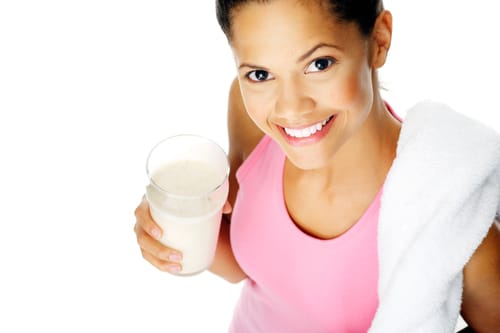 Adding more antioxidants to your diet helps to protect cells against oxidative damage that leads to aging and an increased risk of disease. That’s certainly a good thing, but there’s growing evidence that another nutrient plays a role in how youthful your body looks and how well it functions as you grow older – protein.
Adding more antioxidants to your diet helps to protect cells against oxidative damage that leads to aging and an increased risk of disease. That’s certainly a good thing, but there’s growing evidence that another nutrient plays a role in how youthful your body looks and how well it functions as you grow older – protein.
Protein and Aging: A Macronutrient That Keeps You Looking Buff
Antioxidants are essential for protecting cells, but protein is important for keeping your youthful body composition as you age. As you grow older, not only do you lose bone mass, you shed skeletal muscle too. In essence, all of the protein compartments in your body contract including tissue, blood components, and your immune system. At the same time, the amount of fat tissue you carry around especially around the waist and abdomen increases.
This loss of lean muscle is referred to as sarcopenia, and it has several undesirable consequences. It slows down metabolism or the overall rate at which you burn fat. That’s one reason body fat percentage goes up with age. As lean body mass is lost, it leads to a decline in muscle strength, balance issues and an increased risk of falling and fracturing a bone. Much of the fat mass people put on with age is visceral fat, the kind that deposits deep within the abdominal cavity. This increases the risk of type 2 diabetes and heart disease.
Exercise and Protein Helps to Reduce the Loss of Muscle Mass with Age
Strength-training regularly helps to build strength and preserve lean muscle tissue that’s slowly lost with age. Fortunately, research shows it’s never too late to get benefits from strength training. A study published in the Journal of the American Medical Association challenged ten frail, elderly adults up to 96 years of age to a high-intensity strength-training program. Despite their advanced age, they were able to make significant gains in muscle size and strength as a result of strength-training, and they became more functional. It’s never too late to build new muscle tissue.
As you already know, to build new muscle tissue, you need adequate amounts of dietary protein, and it’s now evident that people need more protein as they age. The general recommendation is that sedentary adults get about 0.8 grams of protein per kilogram of body weight or 0.36 grams per pound of weight. Older adults need 1 to 1.2 grams of protein per kilogram of body weight to meet their baseline protein requirements. Active ones require even more. They need this additional protein simply to maintain a normal nitrogen balance. When they don’t get it, they break down muscle tissue and lose lean body mass. Their metabolism drops, and they gain more fat tissue.
What Does This Mean?
Strength-training and getting adequate age-adjusted amounts of high-quality protein are two of the most important things you can do to preserve body composition as you grow older. At one time there was a concern that a higher protein diet might put additional stress on the kidneys. This doesn’t appear to be true unless a person already has kidney disease.
Getting enough protein through diet and strength-training are the best ways to maintain lean body mass and prevent gains in body fat, but getting enough omega-3 fatty acids and vitamin D helps too. According to a study carried out at Washington University School of Medicine, older people who took an omega-3 supplement experienced a greater synthesis of muscle proteins than those how took a corn oil placebo.
There’s also some evidence that low vitamin D levels contribute to sarcopenia or loss of lean body mass with age. Many people don’t get enough vitamin D. Sunlight is the best source since your body converts precursors on the surface of your skin to active vitamin D when stimulated by ultraviolet light. People who don’t get adequate exposure to sunlight year-round may benefit from a vitamin D supplement, although it’s important to check your vitamin D level first.
The Bottom Line?
Sunshine (within moderation), more fish, dietary protein and strength training – are these the key to keeping a youthful physique? It’ll certainly give you a leg up on looking lean and toned into middle age and beyond.
References:
J Am Coll Nutr. December 2004. Vol. 23. No. suppl. 6275-6305.
JAMA. 1990;263(22):3029-3034.
Am J Clin Nutr. 2011 Feb;93(2):402-12. Epub 2010 Dec 15.
Related Articles By Cathe:
New Study Suggests More Protein is Better for Building Muscle
Can Consuming Protein after a Workout Help You Build More Muscle?
6 Common Protein Myths & Facts That Too Few People Get Right
Will Protein Before Bedtime Help You Build More Muscle?
Exercise During Middle Age Protects Against Muscle Loss Later

